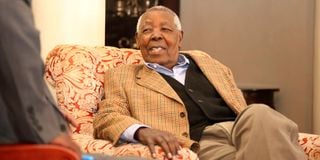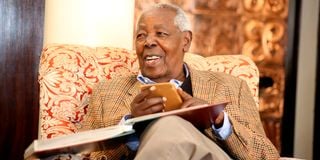Premium
James Karugu, Kenya’s second Attorney-General, dies at 86

Former Attorney-General James Boro Karugu.
James Boro Karugu, Kenya’s second Attorney-General, is dead.
According to his family, Mr Karugu, 86, described as Kenya’s most independent AG, died last night.
“It is true that the old man has rested,” his daughter Vicky Karugu told the Nation.
Mr Karugu has been out of the limelight for the last 40 years – ever since he resigned on June 2, 1981 during the tumultuous years of the Nyayo era.
Mr Karugu had replaced Charles Njonjo, who had quit to join politics. But 15 months later, Mr Karugu surprised the nation after he quit, for unexplained reasons, and retreated back to his Kiamara coffee farm in the outskirts of Kiambu town.
Frank Sandstrom case
His first challenge at the State Law Office was on the famous Frank Sandstrom case, where an American marine had been accused of killing a Mombasa girl, Monica Njeri. The case had turned emotional after Justice Leslie Harris fined Mr Sandstrom Sh500 for killing the girl. Mr Karugu, then, surprised parliament by saying he was not satisfied that justice had been delivered by Justice which was interpreted as an attack on the judiciary.
Mr Karugu had first graduated in history and political science from Ohio State University before proceeding to London for a law degree. He then returned to Kenya to work at the State Law office and was a familiar name in the 1970s when he was the Deputy Public Prosecutor until April 1980 when he was appointed the AG.
It was while he was at the prosecution office that Cabinet Minister Tom Mboya was assassinated and the hunt for the killer led to the arrest of Nahashon Isaac Njenga Njoroge. It was the first case he wanted to prosecute but his senior Mr Clive Brookes decided not yet.
“I wish I had the Mboya case,” Mr Karugu told this writer in the only interview he granted after he left office.
“There was no way we were going to lose this case.”

Former Attorney-General James Boro Karugu.
Another case that was dear to him was the 1970 coup plot against Kenyatta and which implicated the Chief Justice Kitili Mwendwa and army commnader Brigadier Joseph Ndolo. Others were then Yatta MP, Gideon Mutiso and Makerere don Prof Ouma Muga.
“This was a very big case, and focus turned to me. Had I lost that case Mzee (Kenyatta) would not have forgiven me,” he said.
After his appointment as AG, his main worry was that corruption was creeping into the judiciary. As .he left office, he picked a mantra that informed his life outside the government: “I don’t have to be corrupt and I can earn money by farming.”
On the morning he resigned, he took his wife and children to the farm in Kiambu to make what he called an honest living.
“I am lucky my children grew up knowing the joy of hard work,” he said.





